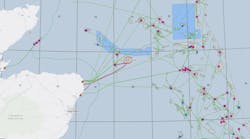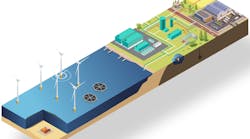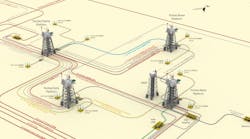Offshore staff
LONDON – Britain’s North Sea industry should view the currently depressed market situation as an opportunity to change how it operates across the basin, according to Halliburton vice president Martin White.
Speaking during last week’s ‘Road to Recovery - UK Oil and Gas Industry Action’ seminar organized by Oil & Gas UK, White acknowledged that many people in the industry were concerned about the future with so much negativity around the market.
But thoughts should be turning instead, he advised, toward how the sector can lower unit costs of everything it does across the basin. “We need investment…but we also need higher returns than we are getting today.”
The standard responses of previous downturns no longer apply, he warned. “Supply chain discounts don’t work: there’s nothing left to squeeze from the service sector, and doing that kills investment and innovation, destroying value.
“You can’t get operators to accept low margins – that won’t work, because capital is global. Nor will asking the UK government to help with taxes, because tax returns are key to the UK economy, especially after the year we’ve just had.
“So, the industry has to collaborate to lower the cost of everything we do.” Lower costs will in turn lowers the basin’s risk profile, he suggested, helping to attract investment from private equity.
“If you look globally, there has been on average a 20-30% reduction in cuts, which leads to 20-30% higher returns for the industry…we have to learn what works and what doesn’t [in the current climate].”
White highlighted the economies of scale that could be achieved through more efficient mobilization and demobilization of drilling rigs, or optimized well sequences for rig-share campaigns involving multiple operators.
He cited a successful multi-operator deepwater well campaign in the Makassar Strait off Indonesia in 2010, and a more recent well P&A program in the UK North Sea involving a co-operation between ConocoPhillips and Chrysaor.
This, he said, delivered cost savings through deployment of fit for purpose, standardized operations across multiple platforms.
From Ecuador to Malaysia, there have been other great examples of shared rig campaigns, he added. “So why should there not be more of these on the North Sea shelf?”
Typical barriers to collaboration – agreement on commercial terms, drilling schedules, anti-competition law – can be overcome if North Sea operators accept the need for collaborative work programs, he suggested.
“Resistance to change and trust between companies is key…we have to change what has been a standard way of working on the shelf for the past 20 years, because this is what has inhibited shared North Sea campaigns in the past.
“Campaigns across the basin create jobs and more value – and every dollar we save can be invested in another project.”
White also note the growing trend in Norway to perform more offshore operations remotely from the shore – more so than in the UK, he said where there appears to be more of a culture of resistance to change.
Advances in automation, and the repercussions of COVID-19, are leading the industry to assess how it can work with fewer people on platforms, he noted. “But there are a lot of opportunities in this regard that the UK continental shelf is not taking up.
“We need to get over the ‘this is how we do it in the North Sea’ mentality.”
08/31/2020





